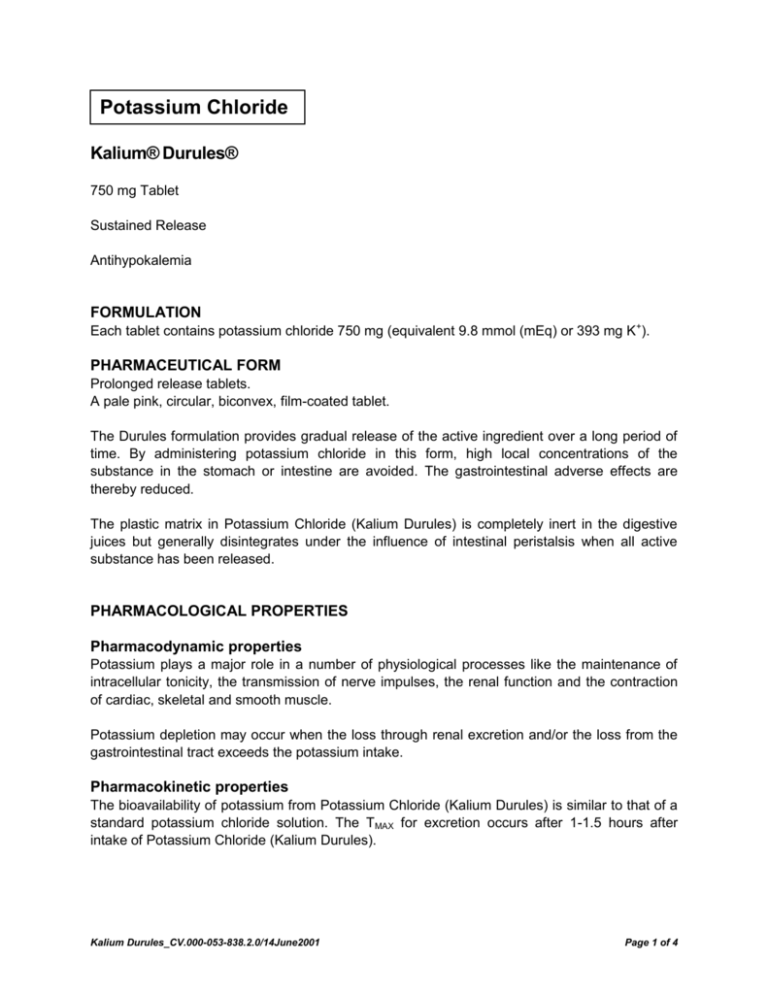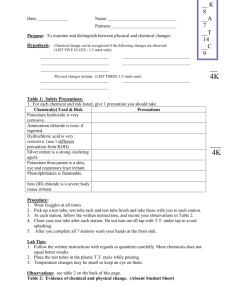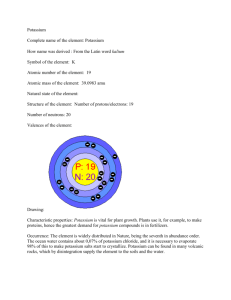Full Product Information
advertisement

Potassium Chloride Kalium® Durules® 750 mg Tablet Sustained Release Antihypokalemia FORMULATION Each tablet contains potassium chloride 750 mg (equivalent 9.8 mmol (mEq) or 393 mg K+). PHARMACEUTICAL FORM Prolonged release tablets. A pale pink, circular, biconvex, film-coated tablet. The Durules formulation provides gradual release of the active ingredient over a long period of time. By administering potassium chloride in this form, high local concentrations of the substance in the stomach or intestine are avoided. The gastrointestinal adverse effects are thereby reduced. The plastic matrix in Potassium Chloride (Kalium Durules) is completely inert in the digestive juices but generally disintegrates under the influence of intestinal peristalsis when all active substance has been released. PHARMACOLOGICAL PROPERTIES Pharmacodynamic properties Potassium plays a major role in a number of physiological processes like the maintenance of intracellular tonicity, the transmission of nerve impulses, the renal function and the contraction of cardiac, skeletal and smooth muscle. Potassium depletion may occur when the loss through renal excretion and/or the loss from the gastrointestinal tract exceeds the potassium intake. Pharmacokinetic properties The bioavailability of potassium from Potassium Chloride (Kalium Durules) is similar to that of a standard potassium chloride solution. The TMAX for excretion occurs after 1-1.5 hours after intake of Potassium Chloride (Kalium Durules). Kalium Durules_CV.000-053-838.2.0/14June2001 Page 1 of 4 INDICATIONS Hypokalemia. Prophylaxis during treatment with saluretic diuretics, especially in combination with digitalis. DOSAGE AND METHOD OF ADMINISTRATION Adults including the elderly Prophylaxis Individual dosage with a minimum dose of 2 tablets daily. Hypokalemia The dosage should be adjusted according to the serum potassium level. Suggested dosage: 2 tablets twice a day, or more, until serum potassium is restored to normal, then prophylactic dosage. Impaired renal function Patients with renal impairment may require lower doses. Monitoring of the serum electrolytes is required. Children There is limited experience with Potassium Chloride (Kalium Durules) in children. The tablets should be swallowed whole, not broken or chewed, together with half a glass of liquid. The tablets should not be administered to a patient in a supine position. CONTRAINDICATIONS Renal insufficiency, hyperkalemia, untreated Addison's disease, stricture of the esophagus and/or obstructive changes in the alimentary tract. Hypersensitivity to the active substance or to any of the excipients. PRECAUTIONS FOR USE The product should be used with caution in the presence of obstructive changes in the alimentary tract, especially in patients with constriction of the esophagus, when there is a potential risk of esophageal complications (local irritation). A liquid potassium product is recommended as a substitute in these cases. Monitoring of serum electrolytes is particularly necessary in patients with heart or kidney disease. Kalium Durules_CV.000-053-838.2.0/14June2001 Page 2 of 4 INTERACTION WITH OTHER MEDICINAL PRODUCTS AND OTHER FORMS OF INTERACTION Concomitant administration of potassium salts and potassium-sparing diuretics like aldosterone antagonists (e.g. spironolactone), amiloride or triamterene may cause severe hyperkalemia and should be avoided. Tacrolimus may cause hyperkalemia or increase the serum concentration of potassium, which should be taken into account when combined with potassium salts. ACE inhibitors may produce some increase in potassium serum levels by inhibiting aldosterone secretion. Potassium supplements should be given to patients concomitantly taking ACE inhibitors only with close monitoring of potassium levels. PREGNANCY AND LACTATION Animal reproduction studies have not been conducted with Potassium Chloride (Kalium Durules). It is not known whether Potassium Chloride (Kalium Durules) can cause fetal harm when administered to a pregnant woman or can affect reproductive capacity. It is unlikely that potassium supplementation that does not lead to hyperkalemia would have an adverse effect on the fetus or would affect reproductive capacity. Potassium Chloride (Kalium Durules) should be given to a pregnant woman only if clearly needed and under physician's guidance with periodic monitoring of serum level. EFFECTS ON ABILITY TO DRIVE AND USE MACHINES Potassium Chloride (Kalium Durules) has no or negligible influence on the ability to drive and use machines. ADVERSE REACTIONS Uncommon: (<1/100) Metabolism: Hyperkalemia. Gastrointestinal: Abdominal pain, diarrhea, nausea. Rare: (<1/1000) Gastrointestinal: Ulceration, perforation and stricture/stenosis of the esophagus or small intestine. Skin: Rash. OVERDOSAGE Symptoms Mainly cardiovascular (hypotension, shock, ventricular arrhythmias, bundle-branch block, ventricular fibrillation leading possibly to cardiac arrest), neuromuscular and gastrointestinal. Beside elevation of serum potassium concentration, typical ECG changes are also noted (increasing amplitude and peaking of T waves, disappearance of P wave, widening of QRS complex and S-T depression). Kalium Durules_CV.000-053-838.2.0/14June2001 Page 3 of 4 Management Gastric lavage, preferably with physiological saline. Continuous ECG-monitoring, dose monitoring of electrolytes and blood gases. Infusion of physiological saline, correction of metabolic acidosis with intravenous sodium bicarbonate. Infusion of glucose and insulin, forced diuresis and possibly peritoneal dialysis or hemodialysis. Use of exchange resins. In case of cramps diazepam. STORAGE Store at a temperature not exceeding 30 °C. CAUTION Foods, Drugs, Devices and Cosmetics Act prohibits dispensing without prescription. AVAILABILITY Bottle of 100s Validity Code CV.000-053-838.2.0 14 June 2001 Manufactured by Interphil Laboratories Inc. Canlubang Industrial Estate, Bo Pittland, Cabuyao, Laguna Philippines For AstraZeneca Pharmaceuticals (Phils.), Inc. 16/F Net 3 Center, Cor. 3rd Ave & 30th St., Bonifacio Global City, Taguig, Philippines Kalium is a trademark of the AstraZeneca group of companies. Please review complete product information before prescribing. Further information available upon request. Kalium Durules_CV.000-053-838.2.0/14June2001 Page 4 of 4








